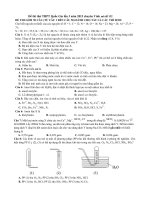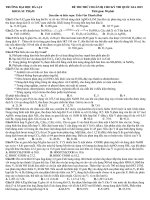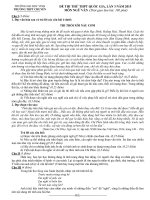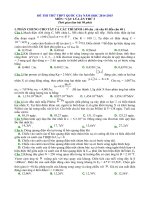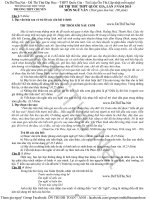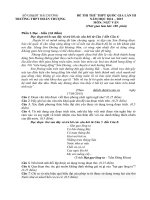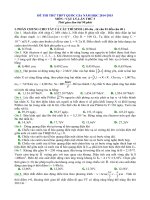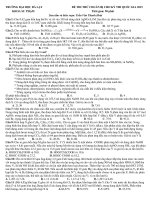De 4 va DA thi Anh thu THPT Quoc Gia lan 3 1718 Tr Nguyen Trai
Bạn đang xem bản rút gọn của tài liệu. Xem và tải ngay bản đầy đủ của tài liệu tại đây (109.64 KB, 5 trang )
ĐỀ KHẢO SÁT THPTQG LẦN THỨ 3
NĂM HỌC 2017- 2018
MÔN TIẾNG ANH
Thời gian làm bài: 60 phút
Mark the letter A, B, C, or D on your answer sheet to indicate the word that differs from the other
three in the position of primary stress in each of the following questions.
Question 1: A. technology B. minority
C. reasonable
D. vocational
Question 2: A. collect
B. advise
C. support
D. promise
Mark the letter A, B, C, or D on your answer sheet to indicate the word whose underlined part differs
from the other three in pronunciation in each of the following questions.
Question 3: A. accurate
B. concentrate
C. intimate
D. fortunate
Question 4: A. halves
B. sneezes
C. oranges
D. dances
Mark the letter A, B, C, or D on your answer sheet to indicate the correct answer to each of the
following questions.
Question 5: I really need a new watch. This one doesn’t _____ very good time.
A. keep
B. show
C. record
D. indicate
Question 6: My sectretary will have finished typing this document before you ______ here tomorrow.
A. come
B. will come
C. will have come
D. has come
Question 7: The conflicts between the two countries should be settled by ______ means, not fighting.
A. diplomacy
B. diploma
C. diplomatic
D. diplomatically
Question 8: The athlete was ______ from the competition for using drugs.
A. omitted
B. sacked
C. disqualified
D. prevented
Question 9: Had you told me that he was going to drop out of college, I ______ it.
A. would have never believed
B. will never believe
C. hadn’t believed
D. can’t believe
Question 10: I don't think your younger sister was hurt. She was just ______.
A. putting it off
B. putting it on
C. taking it off
D. taking it on
Question 11: As a student, you envied your friends who were working and earning their own money,
______ ?
A. weren’t they
B. were you
C. were they
D. didn’t you
Question 12: So little ______ about mathematics that the lecture was completely beyond me.
A. I knew
B. I have known
C. do I know
D. did I know
Question 13: We didn’t play very well because of power lailure. We ______ better.
A. could have played
B. must have played
C. needn’t hane palyed
D. shouldn’t have played
Question 14: The plot of the movie ______ more than a passing resemblance to Jane Auten’s ‘Emma”.
A. takes
B. bears
C. puts
D. lays
Question 15: During the schoolyear, Mary is not allowed________ with friends until she has finished all
her assignments.
A. go out
B. going out
C. of going out
D. to go out
Question 16: The Queen Elizabeth is the largest ship ______ on the Clyde.
A. built
B. building
C. whom
D. which
Mark the letter (A, B, C, or D) to indicate the word that is CLOSEST in meaning to the italic part in
each of the following questions.
Question 17: Scientists warn of the impending extinction of many species of plants and animals.
A. irrefutable
B. imminent
C. formidable
D. absolute
Question 18: The famous racehorse Secretariat had to be destroyed because of a painful, incurable hoof
disease.
A. irreparable
B. vexatious
C. dangerous
D. disabling
Mark the letter (A, B, C, or D) on your answer sheet to indicate the word(s) OPPOSITE in meaning to
the italic word(s) in each of the following questions.
Question 19. He left here like a bat out of hell. I don’t know why he was in such a hurry.
A. a little ridiculous
B. rather strange
C. very slowly
D. quite fast
Question 20: The aircraft carrier is indispensable in naval operations against sea or shore based enemies.
A. exceptional
B. inessential
C. vital
D. exotic
Mark the letter A, B, C, or D on your answer sheet to indicate the most suitable response to complete
each of the following exchanges.
Question 21: Nam: “He’s not interested in Physics, is he?” Lan: “______.”
A. No problem.
B. Yes, he is not at all
C. I promise he isn’t.
D. No, he isn’t, I’m afraid.
Question 22: Mary: “ Luck is of the same importance as effort.”
Harry: “______”
A. Thank you anyway.
B. I can’t agree with you any more.
C. Same here!
D. Why don’t you say that again?
Read the following passage and mark the letter A, B, C, or D on your answer sheet to indicate the
correct word or phrase that best fits each of the numbered blanks.
ENGLISH SPELLING
Why does English spelling have a reputation for being difficult? English was first written down when
Christian monks came to England in Anglo-Saxon ___23___ .They used the 23 letters of Latin to write down
the sounds of Anglo-Saxon speech as they heard it. However, English has a wider range of basic sounds (over
40) than Latin. The alphabet was too small, and so combinations of letters were needed to ___24___ the
different sounds. Inevitably, there were inconsistencies in the way that letters were combined.
With the Norman ___25___of England, the English language was put at risk. English survived, but the
spelling of many English words changed to follow French patterns, and many French words were introduced
into the language. The result was more irregularity.
When the printing press was invented in the fifteenth century, many early printers of English texts spoke
other first languages. They made little effort to respect English spelling. Although one of the shortterm effects of printing was to produce a number of variant spellings, in the long term it created fixed
spellings. People became used to seeing words spelt in the same way. Rules were drawn up and dictionaries
were put together which printers and writers could refer to. However, spoken English was not fixed and
continued to change slowly - just as it still does now. Letters that were sounded in the Anglo-Saxon period,
like the 'k' in 'knife', now became ___26___. Also, the pronunciation of vowels then had ___27___
in common with how they sound now, but the way they are spelt hasn't changed.
Question 23. A. ages
Question 24. A. explain
Question 25. A. invader
Question 26. A. silent
Question 27. A. much
B. centuries
B. express
B. invade
B. quiet
B. many
C. times
C. perform
C. invasion
C. dump
C. few
D. years
D. tell
D. invasive
D. speechless
D. little
Read the following passage and mark the letter A, B, C, or D on your answer sheet to indicate the
correct answer to each of the questions.
One of the highest honors for journalists, writers, and musical composers in the Pulitzer Prize. First
awarded in 1917, the Pulitzer Prize has been won by Emest Hemingway, Harper Lee, John F. Kennedy, and
Rodgers and Hammerstein, among others. As with many famous awards, this prize was named after its
founder, Joseph Pulitzer.
Joseph Pulitzer’s story, like that of many immigrants to the United States, is one of hardship, hard
work, and triumph. Born in Hungary, Joseph Pulitzer moved to the United States in 1864. He wanted to be a
reporter, but he started his American life by fighting in the American Civil War. After the war, Pulitzer
worked for the German – language newspaper, the Westliche Post. His skills as a reporter were wonderful,
and he soon became a partial owner of the paper.
In 1878, Pulitzer was able to start a newspaper of his own. Right from the first edition, the
newspaper took a controversial approach to news. Pulitzer wanted to appeal to the average reader, so he
produced exciting stories of scandal and intrigue. Such an approach is commonplace today, but in Putlizer’s
time it was new and different. The approach led to the discovery of many instances of corruption by
influential people. Pulitzer’s paper became very famous and is still produced today.
The success of Joseph Pulitzer’s newspaper made him a very wealthy man, so he wanted to give
something back to his profession. Throughout his later years, he worked to establish university programs for
the teaching of journalism, and he funded numerous scholarships to assist journalism students. Finally, he
wanted to leave a legacy that would encourage writers to remember the importance of quality. On his death,
he gave two milllion dollars to Columbia University so they could award prizes to great writers.
Question 28.Why does the writer mention “John F. Kennedy” in line 3?
A. He was one of the inventors of the famous awards.
B. He was one of the winners of the Pulitzer Prize.
C. He was one of the people who selected the Pulitzer winners.
D. He was in one of the scandals reported on by Joseph Pulitzer.
Question 29.According to the reading passage, why did Joseph Pulitzer invent the Pulitzer Prize?
A. to encourage people to remember his name and success.
B. to encourage writers to remember the importance of quality.
C. to encourage journalism students to achieve their goals.
D. to encourage people to appreciate the work of the Pulitzer winners.
Question 30.The word “partial” in the passage is closest in meaning to ______.
A. in part only
B. brand new
C. one and only
D. very important
Question 31.According to the reading passage, who receives the Pulitzer Prize?
A. Columbia University graduates.
B. journalism students.
C. noted writers and composers.
D. most newspaper reporters.
Question 32.According to the reading nespaper, how did Joseph Pulitzer appeal to the average reader?A. He
wrote about famous writers of journalism and literature.
B. He wrote stories about the war.
C. He produced his own newspaper.
D. He produced exciting stories of scandal and intrigue.
Question 33.Which sentence about Joseph Pulitzer is true according to the reading passage?
A. He received a scholarship when he was a university student.
B. He was rich even when he was young.
C. He was a reporter during the American Civil War.
D. He immigrated to the United States from Hungary.
Question 34.Which sentence about the Pulitzer Prize is NOT true according to the reading passage?
A. Joseph Pulitzer was the first writer to win the prize in 1917.
B. Winning the prize is the highlight of a writer’s career.
C. Joseph Pulitzer left money to award to the prizewinners.
D. Receiving the prize is one of the highest honors of writers.
Read the following passage and mark the letter A, B, C, or D on your answer sheet to indicate the
correct answer to each of the questions.
There is a strange paradox to the success of the Asian education model. On the one hand, class sizes are
huge by Western standards with between 30 and 40 students per class, in countries like Japan and Korea. On
the other hand, school children in developed Asian economies rank among the highest in the world for
academic achievement in the areas of science and mathematics, especially on standardised tests. Meanwhile,
British secondary school students fail to shine in conditions most educational researchers would say are far
more likely to help them succeed.
Classroom management seems to be easier in places like Korea, and perhaps lessons are more effective as a
direct consequence. After all, we are only too aware of the decline in discipline standards in our own school:
belligerent and disrespectful students appear to be the norm these days. Teachers in Britain seem powerless
to control what happens anymore. Surely this situation cannot create a very effective learning environment,
so perhaps the number of students is far less relevant than is the manner in which they conduct themselves.
But there are other factors to consider, too. There is the home environment. The traditional family unit still
remains relatively intact in Korea. Few children come from broken homes, so there is a sense of security,
safety and trust both at home and at school. In Britain meanwhile, one in every two marriages fails and
divorce rates are sky high. Perhaps children struggle to cope with unstable family conditions and their only
way to express their frustration is by misbehaving at school.
But while the Japanese, Korean and Asian models generally do seem to produce excellent results, the
statistics don’t tell the whole truth. You see, behind those great maths and science scores, there is a quite
remarkable work ethic. Asian students tend to put their education before literally everything else. They do
very few extracurricular activities and devote far more time to their studies than their British peers.
There has been a lot of attention and praise given to these Asian models and their “impressive” statistics of
late. And without question, some of this praise is justified, but it seems to be a case of two extremes in
operation here. At one end, there is the discipline and unbelievably hard work ethic of the Asian students –
success in education before all else. At the other end, British students at times appear careless and extremely
undisciplined by comparison, but at least they do have the free time to enjoy their youth and explore their
interests. Is either system better outright? Or is it perhaps about time we stopped comparing and started
trying to combine the best bits of both, so that we can finally offer our students a balanced, worthwhile
education.
Question 35: British secondary school students ______.
A. have larger class sizes
B. fail at school more than they succeed
C. enjoy better classroom conditions
D. do better on standardised tests
Question 36: What can be implied from the writer’s opinion of the two educational systems discussed?
A. The British system is too strict.
B. The Asian system is clearly better.
C. Both systems are quite satisfactory for different reasons.
D. Neither system is perfect.
Question 37: What does the writer mean when he says there is a “paradox” in the Asian education model?
A. Asian students outperform their peers in other countries.
B. There are too many students in each class.
C. Class sizes are much smaller in other parts of the world.
D. You would expect larger classes to get poorer results but they do not.
Question 38: The traditional family unit ______.
A. is bad for children that come from broken homes
B. is more common in Korean than in Britain
C. is unstable in Korean due to conditions in the home
D. is disappearing in Korean due to high divorce rates
Question 39: The word “unstable” in paragraph 3 can be best replaced by ______.
A. unchangeable
B. unpredictable
C. unimportant
D. unsteady
Question 40: What does the writer suggest might make lessons in Korean schools more successful than in
Britain?
A. Better discipline
B. Better teachers
C. More effective lesson planning
D. Better school Boards of Management
Question 41: The word “They” in paragraph 4 refers to ______.
A. British students
B. Asian students
C. Japanese students
D. Korean students
Question 42: According to the writer, Asian students ______.
A. don’t have as good a work ethic as British ones
B. make a big deal of their good results
C. don’t allow themselves much time to relax and have fun
D. focus too much on recreational activities
Mark the letter A, B, C or D on your answer sheet to show the underlined part that needs correction
in each of the following sentences.
Question 43: Before becoming unsuccessful, Charles Kettering, former vice president of General motors,
was so poor that he had to use hayloft of a barn as a lab.
A. unsuccessful
B. so poor
C. had to
D. a
Question 44: It was such funny a film that I burst out laughing.
A. laughing
B. It
C. such
D. that
Question 45:Animals and men use the energy finding in food to operate their bodies and muscles.
A. their
B. to operate
C. use
D. finding
Mark the letter A, B, C, or D on your answer sheet to indicate the sentence that is closest in meaning
to each of the following questions.
Question 46. Hillary changed her major from linguistics to business. She hoped to find a job more easily.
A. Hillary changed her major from linguistics to business hoping to find a job more easily.
B. Hillary changed her major from linguistics to business although she hoped to find a job more easily.
C. Hillary changed her major from linguistics to business but hoped to find a job more easily.
D. Hillary changed her major from linguistics to business, however, she hoped to find a job more easily.
Question 47.“Would you like to go to the cinema with us tonight, Susan ?” asked her friends
A. Susan’s friends asked her whether she went to the cinema with them that night.
B. Susan’s friends invited her to go to the cinema with them that night.
C. Susan’s friends would like to invite her to go to the cinema with them that night.
D. Susan’s friends would rather her went to the cinema with them that night.
Question 48.The Internet has enabled most people to get contact in a matter of moments.
A. Most people have been able to get in contact by the Internet in a matter of moments.
B. Most people have got in contact as enabled in a matter of moments by the Internet.
C. On the Internet, most people are able to get in contact in a matter of moments.
D. On the Internet, most people can find their contacts in a matter of moments.
Mark the letter A, B, C, or D to indicate the sentence that best combines each pair of sentences in the
following questions.
Question 49.The teacher has done his best to help all students. However, none of them made any effort on
their part.
A. The teacher has done his best to help all students, then, none of them made any effort on their part.
B. Although the teacher has done his best to help all students, none of them made any effort on their
part.
C. Because the teacher has done his best to help all students, none of them made any effort on their part.
D. If the teacher has done his best to help all students, none of them made any effort on their part.
Question 50. Finish your work. And then you can go home.
A. You can’t go home until you finish your work.
B. You finish your work to go home as early as you can.
C. When you go home, finish your work then.”
D. Because you have finished your work, you can go home.
______THE END______
